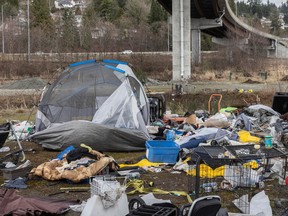
Since 2015, there’s only been one permanent, year-round shelter in the Tri-Cities.

Article content
Time is running out before most homeless people in Coquitlam, Port Coquitlam and Port Moody will be left out in the cold, a local advocate says.
Keir Macdonald, co-chair of the Tri-Cities Homelessness and Housing Task Group, says the region is set to lose an emergency shelter that houses anywhere from 30 to 40 people at Coquitlam’s SureStay hotel. Its lease, which the province first provided funding for during the COVID-19 pandemic, is up in April.
Advertisement 2
Article content
Article content
Coquitlam’s extreme weather shelters, open every year between October and March to house homeless residents overnight, will also close in April.
“The situation is dire and it is about to get worse,” said Macdonald.

Since 2015, the Tri-Cities has had one permanent, year-round shelter at 3030 Gordon Ave. with 30 overnight beds and 30 supportive housing units.
Macdonald is now calling on local citizens to lobby Tri-Cities municipal and provincial politicians to set aside more funding for supportive housing and social service supports in their community.
“There is still not a single place (unhoused) people in the Tri-Cities can go during the day, to take a shower, do laundry, or grab a meal — just those basic necessities,” said Macdonald.
“Emergency shelters were able to bring people indoors overnight, but at 7 a.m. they had to be on a bus to Lincoln SkyTrain station.”
On Friday, collapsed tents and mounds of garbage were signs of a homeless encampment that formed in the middle of Coquitlam’s Cape Horn interchange.
The encampment, which lies between a railroad and several highway overpasses, was the site of a large fire on Jan. 13. It ignited from a candle lit inside a tent, according to Coquitlam Fire and Rescue. Authorities said the man inside the tent at the time survived without injury.
Article content
Advertisement 3
Article content

Fire services previously warned the public that with low temperatures, risks of fire outdoors increase as campers often try to stay warm with candles or propane tanks.
At the time of the blaze, there were two other tents at the underpass encampment. What remains now are piles of debris strewn on the ground, including shopping carts, suitcases and an empty white purse with a grim message scribbled in black ink:
“No reason to live, this life sucks. I wish my car was running so I could gas myself and die,” the note reads.

Homelessness is at an all-time high in the Tri-Cities, according to data from 18 years of Greater Vancouver’s homeless counts. The latest tally, conducted in March 2023 by the Homelessness Services Association of B.C. in partnership with community groups, found the number of unhoused residents in the region has increased 86 per cent since 2020.
Figures show 160 people indicated that they are unhoused — 62 unsheltered and 98 sheltered — compared to the 86 people who said they were three years prior. The Tri-Cities was one of three communities of 11 surveyed that saw the sharpest increase in homelessness. The others were Delta and Richmond.
Advertisement 4
Article content
“It was bad and is only getting worse, and there is no hope on the horizon that anything is underway or coming down the pipeline soon that would see us arrest this slide,” Macdonald said.
“It is not OK that people are sleeping under underpasses for shelter and risking fire to keep themselves warm.”
Recommended from Editorial



Bookmark our website and support our journalism: Don’t miss the news you need to know — add VancouverSun.com and TheProvince.com to your bookmarks and sign up for our newsletters here.
You can also support our journalism by becoming a digital subscriber: For just $14 a month, you can get unlimited access to The Vancouver Sun, The Province, National Post and 13 other Canadian news sites. Support us by subscribing today: The Vancouver Sun | The Province.
Article content

